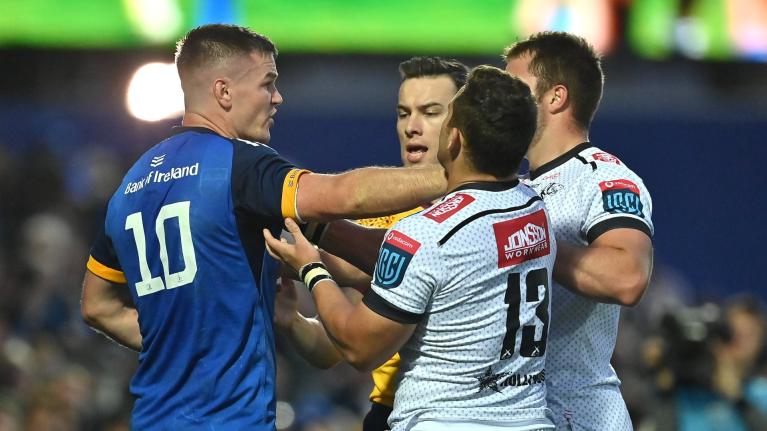The gloves are off in rugby's newest rivalry

Last week I sobbed through Kenneth Branagh’s ode to his home town of Belfast. It doesn’t take much to move me to tears, but this elegiac black and white film of the same name resonated on a personal level. Nostalgia and hope mingle with tensions around class and ethnicity. Generational trauma stemming from British imperialism manifests as civil strife. Many people seek brighter horizons elsewhere, leaving behind those who either can’t or won’t go. Only through the childish eyes of our protagonist do we see a world not defined by pain.
Níl muid comh difriúl. Asihlukile ngaleyo ndlela. Ons is nie soveel anders nie. We’re not so different.
Ireland and South Africa have walked parallel paths on opposite ends of the globe. As early as the 1960s Ireland strongly opposed apartheid in South Africa and would later award Nelson Mandela the Freedom of the City of Dublin while he was still imprisoned in 1988. Unlike every other European country, Ireland welcomes South Africans without having to procure an expensive and time-consuming visa. And on the pitch, standing shoulder to shoulder, are rugby teams representing disjointed peoples under a unifying emblem.
It’s been easy to like Irish rugby. Beyond my admittedly fetishisation of the country’s history, I’ve always had a fondness for the way the team in emerald green approached the game. Brian O’Driscoll was a favourite of mine growing up. Willie John McBride’s name was one that was constantly brought up at family braais.
What’s more, Ireland have hardly been a threat. Not really. Not like New Zealand or England or Australia. Ireland have never progressed beyond the quarterfinals of a World Cup and have won just seven of their 26 matches against the Springboks.
Their provincial sides, storied though they may be in their own hinterland, have largely been ignorable. Sure they have nicked one or two South Africans, depriving our own unions of homegrown talent, but who can begrudge the likes of Ruan Pienaar and Duane Vermeulen the chance to earn some euros in the twilight of their careers?
No more. Now, the kid gloves are off. I don’t care about the shared history, the diplomatic ties or the number of award-winning, coming-of-age comedy-dramas they produce. All the Guinness in the world won’t sway me from my newfound cynicism.
The tipping point arrived with the sight, or rather, the sound, of Johnny Sexton wailing at referee Craig Evans for 80 minutes on Saturday. It was enough to cancel my Premier Sports subscription. He’s one of the greatest flyhalves of all time. Even at 37 he could well be the leading 10 in the game at present. But he shrieked like an unhinged shopper on Grafton Street demanding to speak to the manager.
That was it. Suddenly I was reminded of Ronan O’Gara’s clandestine try while John Smith and his team had their backs turned at Lansdowne Road in 2004. I recalled Keith Wood sucker-punching Gary Teichmann in 1998. I even had the recent triumph of the Emerging Ireland side, claiming a 3-0 win on their tour to South Africa. This time the Irish upstarts were accused of time-wasting by Cheetahs coach Hawies Fourie, an allegation dripping with irony coming from a South African coach. But I didn’t let that cloud my reading of the narrative. My antipathy now stretched down to the grassroots.
So, despite Leinster running out comfortable winners over the Sharks, cantering to a 54-34 victory with Sexton immaculate from the tee, I still had a wicked grin stitched across my face. I was able to access a sordid joy in recounting all those Irish false dawns, all that overblown talk of ‘golden generations’, all of that self-aggrandisement centred on elite schools and fabled academies.
I was surprised by my schadenfreude, usually reserved for foes I fear. And then it hit me like an illegal Bundee Aki clean out. Ireland are now the top team on my ‘love-to-hate’ list. The pleasantries have been stripped from this relationship, exposing raw animosity that could fester into a potentially era-defining rivalry.
The United Rugby Championship has proved a shot in the arm for the Irish game. For too long they’ve had it their own way, bossing the Celtic Cup and then the Pro12. Irish clubs had won 13 titles from a possible 20 with Leinster enjoying a dynastic run of four championships in a row.
And then the South Africans arrived. Stale after getting whipped by New Zealand’s franchises, and disillusioned with a bloated Super Rugby, they found their stride in the new competition after copping a few body blows during a teething period. The Bulls’ win in Dublin in last season’s semi-final might well be the most accomplished performance from a South African club. That the Stormers beat them in the final underlined the strength of depth in the Republic.
Perhaps this is why Sexton was so vocal last Saturday. Granted, he has history, but he won’t need reminding that the South Africans have knocked him and his ilk off their perch. Leinster end their regular season with trips to Johannesburg and Pretoria.
In three weeks' time Ireland, now the top ranked team in the game, will welcome the Springboks to the Aviva. They’ll share a group in next year’s World Cup. If things go awry for his countrymen, Micheál Martin might have a rethink of South Africa’s visa requirements.
Latest Comments
My name is Graham Paterson. I am coping fine . Ardie Savea and Moana Pasfifika deserved there victory. The outstanding David Havili was missed .I think , if you leave out Christian Lio-Willie , who has been so good. Best if Tom Christie starts with Ethan Blackadder and Cullen Grace. Mitchell Drummond too at 9. Some of those guys were short of a gallop against a fired up Pasifika.
Go to commentsTRUST AND RELIABLE BITCOIN, USDT RECOVERY EXPERS FOR HIRE - CONSULT RUDER CYBER TECH SLEUTHS
Go to comments